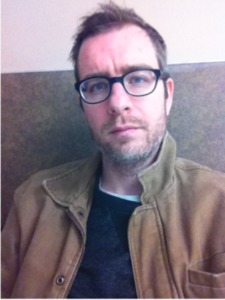Dr. Joseph Hurtgen is a Ball State alumnus with a Ph.D. in English Literature. He has published several articles and is an avid fan of sci-fi. Hurtgen currently teaches at Elizabethtown Community and Technical College. Read more to see how he published his dissertation and to get some advice about research assistantships.
What made you choose English Literature as your study? 
I’ve had a lifelong love affair with books and libraries coupled with a desire to one day become a writer.
How was your experience earning your doctorate?
It was a welcome and constant challenge. I look back with great appreciation to the many professors that mentored me along the way, including Dr. Stuve, who I worked with for three years on educational technology projects, and my amazing dissertation committee chaired by Dr. Mix and including Dr. Habich, Dr. Huff, and Dr. Alves.
How did you choose what to write about for your dissertation?
I was simultaneously writing a novel called Tower Defender (free on Amazon!) about interacting with archives of information through an LSD-like drug. I was interested in how information has shaped individual minds and society at large and how information will shape our bodies and being (dasein to go Hegelian on you) in the future.
Describe your experience publishing your dissertation as a book. What advice do you have for others who want to do the same?
First, your chances at getting your book published are only as strong as your cover letter. So, don’t rush the letter-writing process. Get other people’s eyes on the letter. And make sure that the publisher is a good fit for your book before you make your query. You are picking (or not picking) your publisher as much as they are picking (or, you got it, not picking) you.
The publishing industry doesn’t have the same leniency in re-publishing printed material as academia. While fair-use covers the use of quotations, even extended quotations, in academic writing, publishers must consider legal issues when considering re-publishing content. Any work of literary criticism, by definition, will contain no small amount of quotations. Each of my chapters contained in excess of 1000 words of quoted material. To prepare my book for printing, I had to reduce quoted material to about 500 words per chapter.
Beyond altering quotations, publishing a dissertation as a book is a time-intensive, humbling process. Experts in your field and professional book editors will read your book and tell you its shortcomings. Even though you’ve already spent years crafting your dissertation, now you will have more fine-tuning to undertake and, perhaps, a new chapter or two to add.
Are there any classes in particular that you would recommend?
Pay special attention to Writing in the Profession. It was in WitP that I was equipped with practical tools and strategies for building an audience and publishing scholarly writing (case in point, if you like science fiction criticism, then you might want to check out my blog Rapid Transmission). Within three years of taking WitP, and while still working on the Ph.D., I received my first acceptance letter for a scholarly article.
What advice do you have for English majors?
Sign up for research assistantships in the summer. Not only will you get to engage in interesting projects, you will also get to work closely with an expert. I had the good fortune to assist Dr. Habich for three summers as he worked on his 2017 title Selected Writings of Ralph Waldo Emerson. During those three summers, Dr. Habich related a wealth of practical information about the publishing process–how does one communicate with a publisher; what are the terms of a book contract; how do you prepare a book for publishing. Just as important, I learned firsthand the discipline and regimen required to complete a book-length project. And it was fun!

Comments: